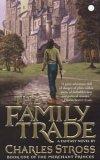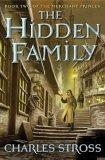

Charles Stross doesn't gloss over this aspect in his Merchant Princes books, The Family Trade and The Hidden Family. The main character, Miriam Bechstein, a high-tech journalist in the Boston area who was adopted as a baby , discovers that her birth family lives in an alternate universe, a more primitive version of our own, where kings still rule and her relatives are merchants who have recently joined the aristocracy. The Machiavelli-like mercantilists have a unique ability to walk between our world and theirs. They've grown rich by trading between universes and are muscling in on the traditional nobility.
Miriam is a believable character. Instead of being awed by her family, she quickly susses that they are a dangerous lot. Extracting herself and going back to her old life is impossible. Her only choice then is to remake the other world into something she can live with. The challenge is to drag her family into the modern world while dodging several factions who would rather kill her than change.
Stross doesn't play the usual comedy/tragedy-of-errors game. Miriam doesn't act like an idiot or miss (most) obvious clues. The dilemmas are convincing, her responses intelligent and the results convincing. Stross also has the journalist type down. As a former high-tech journalist from the Boston area, I recognized the type. There were very few false notes.
I'd recommend buying both books at once. They were originally written as one, and it shows. The ending of the first isn't very satisfying. You'll want to jump straight away into the second. (As usual, you can click on the book covers above to jump right to the Amazon page.)
What I find most enjoyable about Stross is that he's always different. The Merchant series couldn't be more different than Accelerando, and couldn't be more different again from Iron Sunrise or Singularity Sky. The only thing in common among these books is excellent writing.
Tags: Books, SciFi, Review,Charles Stross

